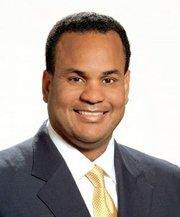By NEIL HARTNELL
Tribune Business Editor
nhartnell@tribunemedia.net
The Government’s fiscal plans will eliminate just its recurrent - not the total - deficit, a Cabinet Minister yesterday explaining this would still be “a major step forward” if achieved.
Michael Halkitis, minister of state for finance, confirmed to Tribune Business that the Government expected to still run fiscal deficits, albeit much reduced, for “at least the next few years”.
This was because the Government has always traditionally run a capital deficit totalling, on average, around $220 million to $250 million per fiscal year, because its spending on infrastructure and works projects is not offset/counterbalanced by any capital revenues coming in.
“There are usually no capital revenues, so the Government usually runs a capital deficit which, when combined with the recurrent balance, give us the total deficit,” the Minister explained.
“Over the longer term, a capital balance of zero is very desirable but, realistically, we expect to be running capital deficits for at least the next few years. Our aim will be to minimise this as much as possible.”
Mr Halkitis’s comments shed new light on the Government’s fiscal objectives, and confirm that its main target is to ‘balance’ the recurrent or ‘primary’ side of the Budget.
To do this, it will need its revenues - collected from taxes, fees and the proposed Value-Added Tax (VAT) to equal, or exceed, recurrent expenditure. The latter goes on the Government’s fixed costs, primarily civil service wages, rents and debt servicing.
As a result, the Bahamas will still run total deficits, due to the imbalance on the capital side of its Budget.
Still, eliminating the recurrent deficit is a noble goal, and Mr Halkitis told Tribune Business: “Eliminating the recurrent deficit, however, would be a major step forward. It would mean that you are no longer borrowing money to pay your recurrent expenditures - salaries etc.”
Mr Halkitis, though, said there had been no decision or discussion on whether to end the real property exemptions for undeveloped land in New Providence and Bahamian-owned properties in the Family Islands.
Tribune Business sources suggested that the Government was looking to implement these reforms in July’s 2013-2014 Budget, in a bid to increase short-term revenue flows.
However, the Minister said yesterday: “There is no decision on this; in fact the idea has not been discussed. Finance has done no studies and has made no recommendations to government to implement such a change.”
In his comments to the Bahamas Chamber of Commerce and Employers Confederation’s Wednesday luncheon, Mr Halkitis said: “The range of actions in our medium-term fiscal consolidation plan will target both a significant reduction in the relative weight of recurrent and capital expenditures, and an appreciable enhancement in the yield of our revenue system.
“These actions will thus be structured such as to secure our target of eliminating the deficit on the Recurrent Account of the public finances. They will also secure the objective of engineering a reversal in the trend of the debt burden and, over time, getting it back to a level that is desirable and sustainable.”
All this indicates that comments by Moody’s, the Wall Street credit rating agency, that the Government was seeking to balance its Budget by 2016-2017, referred specifically to the recurrent Budget - not the capital side or the total Budget/deficit.
Moody’s said that even this target was “overly optimistic”, as it required an “unprecedented” positive swing of almost $400 million on the primary side alone.
It added that the Christie administration’s fiscal forecasts were based on GDP growth rates, and debt servicing costs, that were “too favourable” given historical trends.
Providing an insight into the Government’s own thinking, the Wall Street credit rating agency said in its Bahamas country analysis that the ‘balanced Budget’ plan was based on the Bahamian economy achieving a nominal average GDP growth rate of 3.5 per cent per annum between now and the 2016-2017 fiscal year.
This, Moody’s said, was a full percentage point higher than the 2.5 per cent nominal average GDP growth rate achieved between 2010-2012.
And the Wall Street rating agency added that the Christie administration was also banking on “effective” interest rates on its debt of 4.3 per cent - a servicing cost much lower than the 5.2 per cent average that the Bahamas’ sovereign debt attracted between 2006 and 2011.
Indeed, Moody’s said the effective interest rate on government debt had averaged 5.5 per cent from 2005-2012 - more than one percentage point higher than the Christie administration’s target.
It indicated that the Christie administration is projecting that it will achieve a primary budget surplus of 1 per cent in 2015, followed by an even greater surplus - equivalent to 2.4 per cent of GDP - in 2016.
Moody’s said achieving the Christie administration’s primary budget surplus targets would require “an unprecedented correction”.





Comments
Use the comment form below to begin a discussion about this content.
Sign in to comment
OpenID